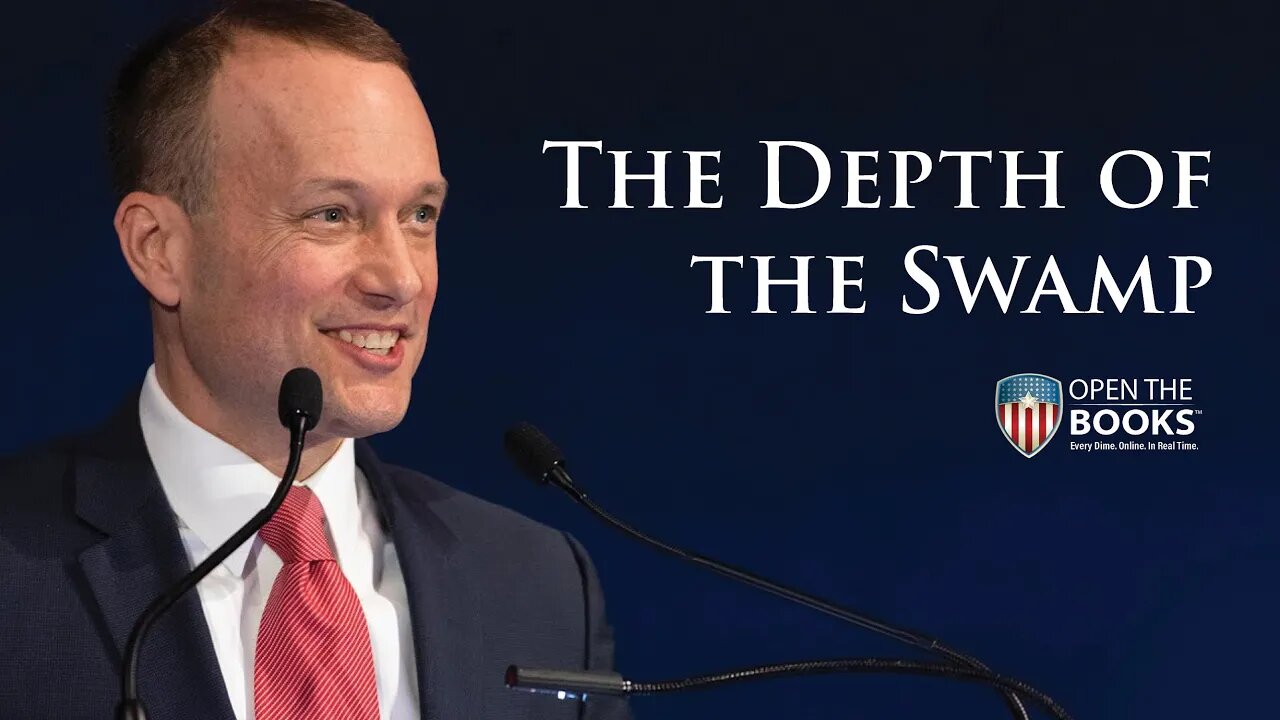Premium Only Content

"Depth of the Swamp" by Open The Books CEO Adam Andrzejewski
Adam Andrzejewski, CEO & Founder of OpenTheBooks.com, addresses the Hillsdale College National Leadership Seminar in Naples, Florida on February 20, 2020. There were approximately 900 people attending the seminar. @Hillsdale College
1:51 Ivy League Colleges
4:28 Illinois: The Super Bowl of Corruption
6:25 OpenTheBooks Vision
9:14 Mapping the Swamp
13:23 Public Employee Salaries
15:14 California: San Francisco Human Waste Crisis & Why We're Suing California
19:34 New York Gov. Andrew Cuomo's Pay-To-Play Scandal
20:29 Farm Subsidies
21:12 Small Business Administration
22:59 Rising Healthcare Costs
25:10 Veterans Affairs Scandal
27:49 The National Debt
28:40 The Congressional Favor Factory
30:22 War on Waste: Strategy to end taxpayer abuse
32:21 Where's The Pork? Oversight Report that outlines wasteful grants
33:26 Improper Payments
35:15 Ue-It-Or-Lose-It Spending Spree
38:38 The President's Budget to Congress for 2021
41:24 Questions
The Depth of the Swamp. Topics covered included the federal funding of the Ivy League, Mayor Rahm Emanuel, U.S. farm subsidies, "small" business lending, top "non-profit" hospitals making huge profits, mapping the swamp, and mis-allocation of resources at Veterans Affairs.
Furthermore, Andrzejewski described his organizations efforts to map the San Francisco human waste challenge and their lawsuit to force open California state checkbook expenditures.
We believe that Transparency is Revolutionizing U.S. public policy and politics. We published an Open Letter To President Donald Trump and 100 Examples of outrageous federal waste in The Wall Street Journal and USA Today six-times. We encouraged the President to embrace the Transparency Revolution, declare War on Waste, and as Commander in Chief, to defend the American taxpayer against waste, fraud, corruption and taxpayer abuse.
Andrzejewski describes the target-rich environment to expose government waste and corruption within federal grants, improper and mistaken payments, and the $100 billion spent on year-end use-it-or-lose-it spending sprees.
-
 1:16:07
1:16:07
Man in America
12 hours agoOperation Gladio: The CIA, Mossad & City of London’s Plan for a New World Order
29.8K34 -
 2:11:41
2:11:41
Badlands Media
14 hours agoDEFCON ZERQ Ep. 016: Shadow Governments, Ancient Tech & the Spiritual War for Humanity
87.6K64 -
 2:09:24
2:09:24
Inverted World Live
8 hours agoRats Have Learned to Hunt Bats | Ep. 135
35.3K15 -
 2:48:01
2:48:01
TimcastIRL
9 hours agoLIVE Election Coverage: Polling Stations SWATTED, Bomb Threats Called In | Timcast IRL
261K179 -
 3:30:07
3:30:07
Barry Cunningham
9 hours agoBREAKING NEWS: COUNTDOWN TO COMMUNISM! ELECTION RESULTS SHOW!
63.1K52 -
 2:11:28
2:11:28
DeVory Darkins
8 hours agoLIVE NOW: 2025 Election results and Exit Polls AMA
72.7K57 -
 2:34:04
2:34:04
DLDAfterDark
7 hours ago $0.09 earnedJust Another Tuesday - In Virginia - The Governor's Race & Glock Talk
31.1K7 -
 3:21:38
3:21:38
The Charlie Kirk Show
10 hours agoJUDGMENT DAY 2025: The Election Results Stream
203K87 -
 3:51:07
3:51:07
MattMorseTV
11 hours ago $0.82 earned🔴Election Day LIVE COVERAGE.🔴
100K49 -
 1:16:51
1:16:51
Flyover Conservatives
1 day agoSHOCKING DATA REVEALS: Young Voters Are Done With the Old GOP - Mark Mitchell, Rasmussen Reports | FOC Show
43.7K21